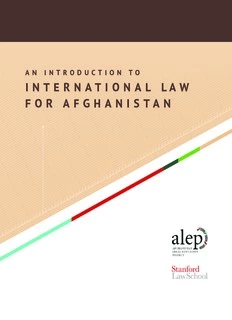
An Introduction to International Law for Afghanistan PDF
Preview An Introduction to International Law for Afghanistan
A N I N T R O D U C T I O N T O I N T E R N A T I O N A L L A W F O R A F G H A N I S T A N An Introduction to International Law for Afghanistan Afghanistan Legal Education Project (ALEP) at Stanford Law School http://alep.stanford.edu [email protected] Stanford Law School Crown Quadrangle 559 Nathan Abbott Way Stanford, CA 94305-8610 www.law.stanford.edu © Afghanistan Legal Education Project at Stanford Law School © Afghanistan Legal Education Project at Stanford Law School ALEP – STANFORD LAW SCHOOL Authors Morgan Galland (Student Director, 2010-11) Evan Berquist Stephanie Gosnell Handler Nicholas Reed Michael Sulmeyer Editors Ingrid Price (Student Co-Director, 2012-13) Julian Simcock (Student Co-Director, 2012-13) Tres Thompson (Student Director, 2014-15) Mansi Kothari Catherine Baylin Nicholas Reed Faculty Director Erik Jensen Contributing Faculty Editor Allen Weiner Rule of Law Program Executive Director Megan Karsh Program Advisor Rolando Garcia Miron AMERICAN UNIVERSITY OF AFGHANISTAN Contributing Editors Wadir Wadeer Safi Yama Keshawerz Chair of the Department of Law Taylor Strickling, 2012-13 Hadley Rose, 2013-14 Mehdi Hakimi, 2014- TABLE OF CONTENTS PREFACE...................................................................................................................................xiii! CHAPTER 1: INTRODUCTION TO INTERNATIONAL LAW...........................................1! I. INTRODUCTION...................................................................................................................1! A. Sovereignty and Voluntary Compliance............................................................................2! B. Origins of International Law..............................................................................................3! C. Theories in International Law.............................................................................................4! II. ROADMAP............................................................................................................................5! III. CONCLUSION.....................................................................................................................7! OVERVIEW OF INTERNATIONAL ORGANIZATIONS.....................................................8! GLOSSARY................................................................................................................................10! CHAPTER 2: THE SOURCES OF INTERNATIONAL LAW.............................................11! I. INTRODUCTION.................................................................................................................11! Where Does International Law Come From?...................................................................11! II. SOURCES OF INTERNATIONAL LAW: ARTICLE 38(1) OF THE STATUTE OF THE INTERNATIONAL COURT OF JUSTICE.........................................................................12! A. The Law of Treaties..........................................................................................................14! Why Do We Have Treaties?.............................................................................................14! What Is a Treaty?..............................................................................................................15! Clarification: The Vienna Convention on the Law of Treaties.........................................16! Bringing a Treaty into Effect: Signing versus Ratifying..................................................16! Bringing a Treaty into Effect: Reservations, Understandings, and Declarations.............17! How Does a Treaty Work?...............................................................................................18! B. Customary International Law...........................................................................................20! State Practice: Uniform, Consistent, and General............................................................21! Uniformity.........................................................................................................................21! Consistency and Generality..............................................................................................22! v Opinio Juris et Necessitatis: Legally Necessary or Obligatory........................................23! Evidence............................................................................................................................23! Jus Cogens........................................................................................................................24! C. General Principles of Law................................................................................................25! D. Subsidiary Means: Judicial Decisions and the Teachings of Scholars.............................28! Brief Overview of Select International Courts and Tribunals..........................................28! III. MODERN SOURCES OF INTERNATIONAL LAW: INTERNATIONAL ORGANIZATIONS..............................................................................................................31! III. CONCLUSION...................................................................................................................34! GLOSSARY................................................................................................................................36! CHAPTER 3: THE NEXUS BETWEEN INTERNATIONAL LAW AND AFGHANISTAN’S DOMESTIC LAW....................................................................................38! I. INTRODUCTION AND OPENING INQUIRIES................................................................38! Separation of Powers........................................................................................................38! II. THE TREATY-MAKING PROCESS IN AFGHANISTAN...............................................40! Signature...........................................................................................................................40! Ratification........................................................................................................................40! III. ARE INTERNATIONAL LAW AND DOMESTIC LAW DISTINCT SYSTEMS?: THE THEORIES OF MONISM AND DUALISM.......................................................................41! The Theories of Monism and Dualism.............................................................................41! IV. INCORPORATION OF INTERNATIONAL LAWS INTO DOMESTIC LAW IN PRACTICE............................................................................................................................47! International Law in Afghanistan’s Constitution..............................................................48! Customary International Law and Other Sources of International Law Not Named in the Constitution.......................................................................................................................52! V. THE COMPATIBILITY OF DOMESTIC AND INTERNATIONAL LAW PROVISIONS ...............................................................................................................................................53! Who Has the Authority to Determine Compatibility?......................................................55! VI. THE HIERARCHY OF SOURCES OF LAW IN AFGHANISTAN................................63! vi The UN Charter, International Treaties, International Conventions that Afghanistan has Signed, and the Universal Declaration of Human Rights.................................................63! Customary International Law...........................................................................................66! VII. OTHER CONSIDERATIONS..........................................................................................66! VIII. CONCLUSION................................................................................................................68! GLOSSARY................................................................................................................................69! CHAPTER 4: INTERNATIONAL HUMAN RIGHTS LAW................................................70! I. INTRODUCTION.................................................................................................................70! What Is International Human Rights Law?......................................................................70! II. PRECURSORS TO HUMAN RIGHTS LAW....................................................................71! III. HISTORICAL DEVELOPMENT OF HUMAN RIGHTS LAW......................................73! A. The UN Charter................................................................................................................73! B. The Universal Declaration of Human Rights...................................................................74! IV. CONTEMPORARY INTERNATIONAL HUMAN RIGHTS LAW................................75! A. International Covenant for Civil and Political Rights (ICCPR).......................................75! B. International Covenant for Economic, Social and Cultural Rights (ICESCR).................77! C. Additional UN Human Rights Instruments......................................................................79! D. Role of Customary International Law in Human Rights..................................................80! V. ENFORCEMENT OF INTERNATIONAL HUMAN RIGHTS LAW...............................82! A. Enforcement of the UN Charter and Declaration of Human Rights................................82! B. Enforcement of Human Rights Treaties...........................................................................83! VI. INTERNATIONAL HUMAN RIGHTS IN AFGHANISTAN.........................................85! The Afghan Constitution...................................................................................................85! VII. CONCLUSION.................................................................................................................88! GLOSSARY................................................................................................................................89! CHAPTER 5: THE PEACEFUL RESOLUTION OF INTERNATIONAL LEGAL DISPUTES...................................................................................................................................90! I. INTRODUCTION.................................................................................................................90! vii II. INFORMAL METHODS OF INTERNATIONAL DISPUTE RESOLUTION..................91! A. Negotiation, Mediation, Good Offices and Conciliation..................................................92! Negotiation........................................................................................................................92! Mediation, Good Offices and Conciliation.......................................................................95! B. Arbitration.........................................................................................................................97! Historical Development of Modern Arbitration...............................................................97! Procedure, Awards and Enforceability.............................................................................99! Advantages and Disadvantages of International Arbitration..........................................102! C. Dispute Resolution at the WTO: Arbitration and Judicial Decision Making.................103! The WTO Dispute Settlement Understanding................................................................105! III. JUDICIAL MECHANISMS OF DISPUTE RESOLUTION...........................................108! A. The International Court of Justice..................................................................................108! Composition and Organization.......................................................................................108! Jurisdiction in Contentious Cases...................................................................................109! Advisory Opinions..........................................................................................................113! B. Regional and Specialized Courts....................................................................................114! IV. CONCLUSION.................................................................................................................114! GLOSSARY..............................................................................................................................115! CHAPTER 6: USE OF FORCE..............................................................................................116! I. AN INTRODUCTION TO THE USE OF FORCE.............................................................116! A. Why is the Use of Force Important in International Law?............................................117! B. Historical Background...................................................................................................118! II. Jus ad Bellum: Law on the Use of Force...........................................................................121! A. Jus ad Bellum and the Charter of the United Nations...................................................121! B. Customary International Law........................................................................................128! Necessity.........................................................................................................................128! Proportionality................................................................................................................128! viii III. JUS IN BELLO – THE CONDUCT OF WARFARE......................................................130! A. Hague Law: Restrictions on Methods of Warfare.........................................................131! B. Geneva Law: Protections for Victims of Warfare.........................................................133! The Power to Appoint Protecting Powers and Services of an Impartial Humanitarian Body................................................................................................................................135! Applicability: International versus Non-International Armed Conflict:.........................136! C. Arms Control.................................................................................................................139! III. THE USE OF FORCE AND THE LEGAL REGIME OF THE UNITED NATIONS....141! A. The UN Security Council..............................................................................................141! B. Chapter VII of the UN Charter......................................................................................149! C. Humanitarian Interventions and Peacekeeping Operations...........................................151! D. Provision for Regional Security Arrangements.............................................................153! IV. TERRORISM AND THE USE OF FORCE...................................................................154! A. What is Terrorism?........................................................................................................154! B. International Efforts to Develop a More Robust International Legal Framework........155! V. AFGHANISTAN AND THE USE OF FORCE SINCE 2001...........................................159! A. Overview of the Use of Force in Afghanistan after 9/11..............................................159! B. ISAF and the Role of NATO in Afghanistan................................................................161! V. CONCLUSION..................................................................................................................163! GLOSSARY..............................................................................................................................169! CHAPTER 7: INTERNATIONAL CRIMINAL LAW.........................................................170! I. INTRODUCTION...............................................................................................................170! What is International Criminal Law?..............................................................................170! II. PART ONE: TRANSNATIONAL COOPERATION.......................................................172! A. Forms of Transnational Cooperation: Extradition..........................................................172! B. Forms of Transnational Cooperation: Mutual Legal Assistance Treaties......................174! C. Offenses Targeted for Transnational Cooperation: Terrorism.......................................175! D. Offenses Targeted for Transnational Cooperation: Narcotics........................................181! ix
Description: